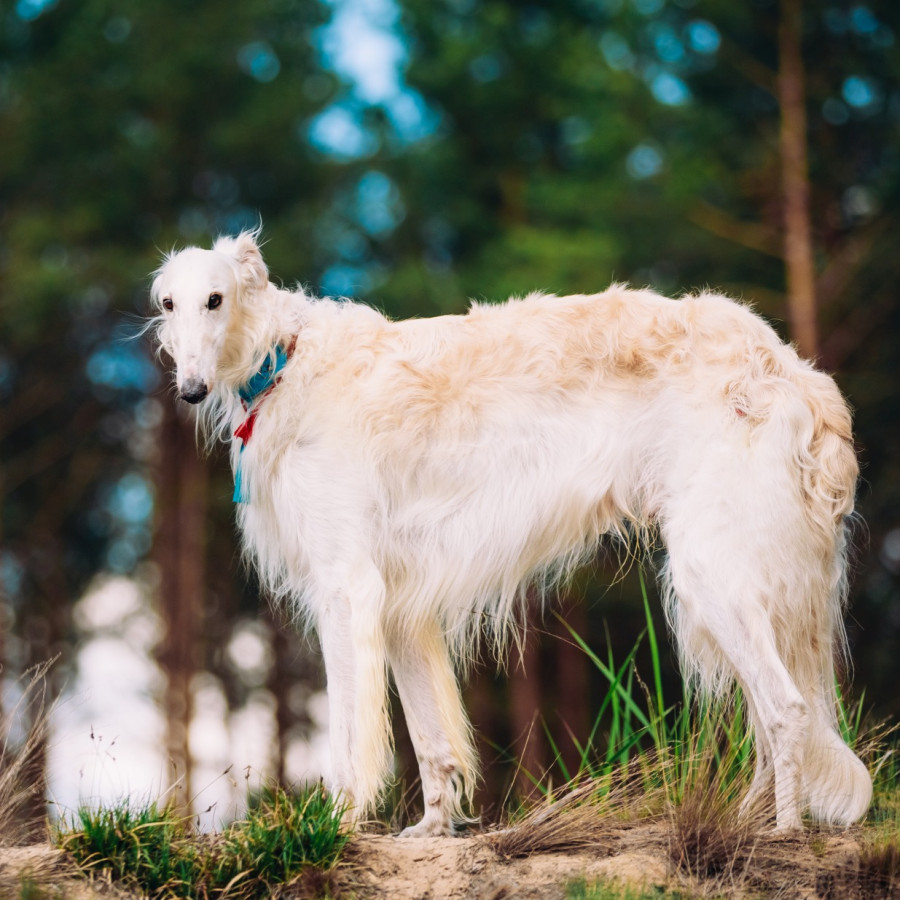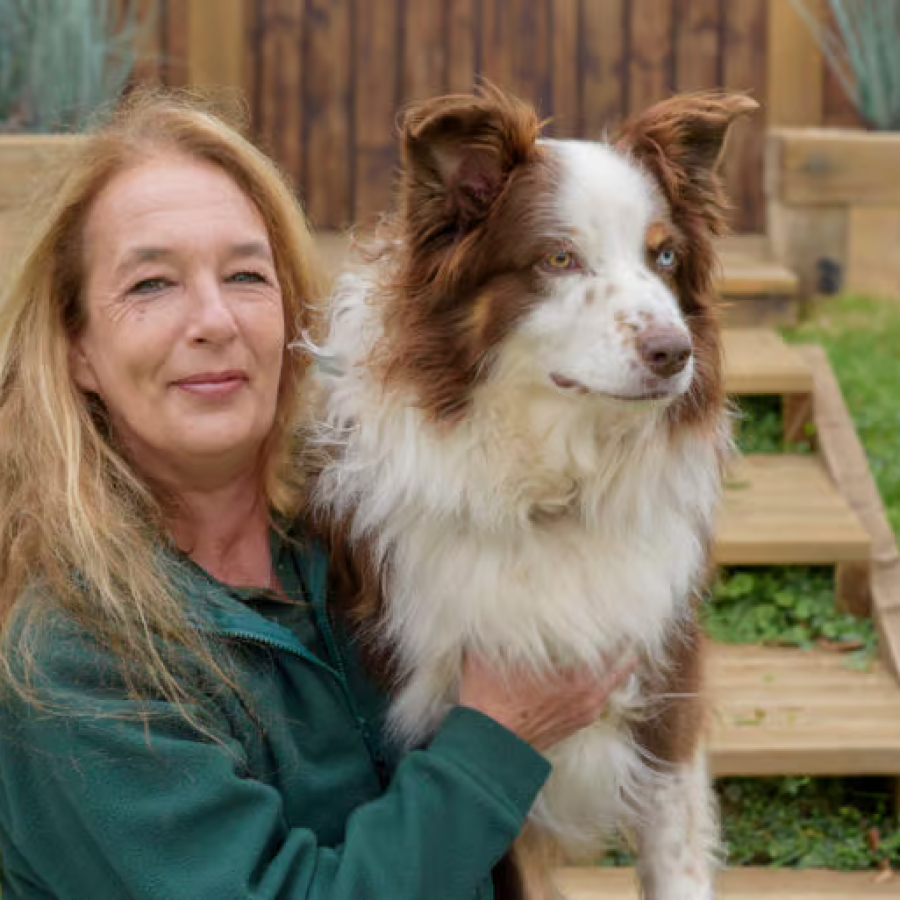
Borzoi Dog Breed
Both speedy sprinters and couch potatoes, Borzois are quietly affectionate and prefer peaceful homes.

Both speedy sprinters and couch potatoes, Borzois are quietly affectionate and prefer peaceful homes.
Borzois are elegant, gentle, goofy giants. Bred to hunt wolves, the Borzoi dog breed is an excellent sprinter...but also a world-class couch potato. Borzois need space to run and an owner who appreciates their sensitive nature. If you're looking for an athlete on walks and a sloth at home, a Borzoi might be for you.
The Russian Borzoi dog is known for their serene and cat-like personality. They're gentle and affectionate with their family, and love lounging in peaceful, predictable environments. They can be aloof with strangers but form deep bonds with their people. Despite their large size, they are incredibly graceful.
Don't be fooled by their relaxed nature. Borzoi means "fast" in Russian, and they live up to their name! They were bred to chase, and that instinct is still strong. Given the chance, they'll take off after anything that moves, so this Borzoi temperament can be a challenge when it comes to recall training. It's safest to keep your Borzoi Russian Wolfhound on a lead or only let them off in secure, enclosed areas like dog walking fields.
Their independent streak means they're not always eager to follow instructions - they see them more as suggestions! But they're an intelligent breed and will learn enthusiastically if you motivate them with treats and toys. These Borzoi traits mean training works best when it’s positive and reward-based.
Disclaimer
While these breed traits give a general idea of what to expect from a specific type of dog, it's important to remember that every dog is unique. Just like people, each dog comes with their own distinct personality, quirks, and characteristics!

Borzois can be wonderful family dogs in the right home. They’re gentle and affectionate with older children but can be sensitive to loud noises and rough play, making them less suited to very young kids. Like all dogs, it’s important to actively supervise Borzois around children to prevent any accidents or inappropriate interactions.
They often get along well with other dogs, particularly fellow sighthounds that look like them. But their strong prey drive makes them a poor match for households with other small pets like cats or rabbits. Even if you raise your Borzoi from a young age to be calm and gentle around your own cats, they’re almost certain to chase the neighbour’s cat!
Yes—but usually on their own terms! They may be canines, but they have a royal history and their personality is much more like a cat’s. They’re loving and form strong bonds with their family but aren’t overly needy.
They enjoy quiet companionship and will happily rest near you rather than demand constant attention. They have a refined way of showing affection, often leaning against their favourite humans or offering a gentle nuzzle. They will happily accept constant gentle scritches, but if you’re looking for a lapdog or a dog that loves big, public displays of affection, keep looking!
Borzois enjoy play, but they aren’t non-stop goofballs. They tend to have short bursts of excited energy, enjoying a quick zoom around the garden or a game of chase with other dogs before returning to their favourite pastime—lounging. Historically owned by Russian Tsars and aristocrats, Borzois prefer elegant, flowing movement over chaotic, rough-and-tumble games.
Nope! True to their aristocratic ancestry, Borzois are generally quiet and reserved. They rarely bark without reason, making them poor guard dogs but excellent companions for those who prefer a peaceful home. If they do bark, it’s often at something specific, such as an unfamiliar visitor or a worrying noise, and they’ll quiet down quickly.
Without proper training, socialisation, exercise, and mental stimulation, all dogs can develop behavioural issues.
Having been bred as wolfhounds and to hunt prey, Borzois are known for their strong hunting and chasing instinct. This makes off-lead walks risky unless done in a secure and enclosed area, or with a dog you’ve trained to have a solid recall (this will take lots of time, energy, and treats!).
On that note, their independent and very laid-back nature can make training a challenge. They may ignore your requests if they see something more interesting or think training isn’t worth their time and energy.
They can also be sensitive and will do their best to move away in situations that make them uncomfortable, like being handled too roughly or trained with harsh methods. Whilst they’re generally laid back, they may develop separation anxiety if left alone for too long.
Borzois need plenty of space to stretch out and sunbathe, as well as a large, secure garden to pick up speed when they need to burn off some energy. Their home should be a peaceful place where they can enjoy both relaxation and occasional bursts of exercise.
Apartment living can work if you’re dedicated to providing enough outdoor activity, but they're definitely happiest with room to stretch out. They need a family who appreciates their gentle but independent personality and is willing to manage their strong prey drive with training and secure spaces.
Borzois need around one hour of daily exercise, but their energy comes in short bursts. Despite their long and elegant strides they’re not built for endurance, so exercising little and often suits them best.
Consider two 20-30 minute walks a day to keep their energy levels nicely balanced. A secure area where they can run at full speed is essential too, as they were bred to chase and hunt wolves and other animals. They also need mental stimulation, such as scent work or problem-solving games, to prevent boredom.
Borzois are intelligent but independent, meaning training takes patience. They learn quickly but need motivation to follow commands.
All dogs require reward-based training and socialisation to learn basic behaviours, as well as how to interact with other dogs, animals, and people. Without early socialisation they can develop anxiety or rude behaviour in certain situations, making them harder to manage and requiring extra time and training when they’re older.
As dogs mature, they go through several life stages that can change their behaviour and require you to focus on certain aspects of training. We can help you with this through our free behaviour helpline.
Common behavioural issues to watch out for in Borzois include:
• Separation related issues
• Poor recall due to prey drive
• Pulling on lead
• Sensitivity to harsh training
• Ignoring instructions if something more interesting is happening
Borzois have long, silky coats that require regular brushing to prevent mats and tangles. Their fine fur picks up dirt easily but a thorough brushing with a pin or slicker brush, two to three times a week, will keep them knot and dirt-free. You may need to pay extra attention during seasonal shedding to keep their luscious locks off your floors and sofa.
Their thin skin is prone to cuts and scrapes, so regular checks are important. Due to their low body fat, they’ll need a coat and/or jumper in winter if you live in a colder climate.
Regular baths, nail trimming, ear cleaning, and dental care are also important for your dog’s overall well-being. This can be done at home if you train your dog to enjoy grooming from the start.
Keeping your dog healthy involves regular vet check-ups and vaccinations, a balanced and complete diet, consistent exercise, and maintaining a healthy weight. This everyday care is crucial to preventing common health issues and reducing the impact of any health issues your dog already has.
Common health conditions in Borzois include:
• Bloat
• Sensitivity to anaesthesia
• Heart disease
• Hip dysplasia
• Osteosarcoma (bone cancer)
With good care, regular vet visits, and a healthy lifestyle, many of these risks can be minimised, ensuring your Borzoi lives a long and happy life.
I am a Borzoi and running is in my DNA, so I need a safe, enclosed sprinting area. If I don’t get my zoomies in, I’ll sulk or decide your furniture is my personal racetrack!
I may look relaxed, but my brain needs a workout! If not, I might make up my own games—like "chase the squirrel" or "pretend I can’t hear you."
Training me requires patience and rewards—I’m smart but have my own agenda. Teach me recall and how to resist chasing. Keep it fun, I might just humour you!
Initial costs of a Borzoi:
• Purchase price: £1,000–£2,500
• Basic equipment: £150–£300
• Training classes: £50–£150
• Neutering: £200–£400
Ongoing costs of a Borzoi:
• Food: £50–£100 per month
• Insurance: £30–£70 per month
• Vet bills: £200–£600 annually
• Grooming supplies: £50–£150 annually
• Dog walkers/boarding fees: £10–£25 per walk or £25–£50 per night
Take our quiz to discover which breed is right for you
Take our quizPlease call our pet support line on 0300 303 9333 (7 days a week – 8.30am - 4pm)
